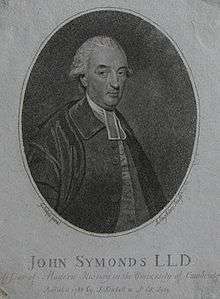John Symonds (academic)
John Symonds (1730–1807) was an English academic, who became professor of modern history at the University of Cambridge.

Life
Born at Horningsheath in Suffolk on 23 January 1730, he was the eldest son of John Symonds (died 1757), rector of the parish, by his wife Mary (died 1774), daughter of Sir William Spring of Pakenham, bart.[1][2]
Symonds was educated at St John's College, Cambridge, graduating B.A. in 1752. In 1753 he was elected a fellow of Peterhouse, and he proceeded M.A. in 1754. He was admitted to the Middle Temple in 1747, and was called to the bar in 1756.[1][3]
In 1771 Symonds was appointed professor of modern history on the death of Thomas Gray and in the following year he was created LL.D. by royal mandate and migrated to Trinity College. He died, unmarried, on 18 February 1807, at Bury St Edmunds, where he acted as recorder, and was buried at Pakenham.[1]
In his will Symonds gave directions for the donation of books to the Historical Library at Cambridge. He is regarded as the founder of the library.[4]
Works
Symonds was the author of:[1]
- Remarks on an Essay on the History of Colonisation (on a work by William Barron), London, 1778
- The Expediency of revising the Present Edition of the Gospels and Acts of the Apostles, Cambridge, 1789
- The Expediency of revising the Epistles, Cambridge, 1794
He also contributed to Arthur Young's Annals of Agriculture.[1]
Notes
- 1 2 3 4 5
 Lee, Sidney, ed. (1898). "Symonds, John (1729-1807)". Dictionary of National Biography. 55. London: Smith, Elder & Co.
Lee, Sidney, ed. (1898). "Symonds, John (1729-1807)". Dictionary of National Biography. 55. London: Smith, Elder & Co. - ↑ "Symonds, John (SMNS712J)". A Cambridge Alumni Database. University of Cambridge.
- ↑ "Symonds, John (SMNS747J)". A Cambridge Alumni Database. University of Cambridge.
- ↑ Endowments of the University of Cambridge. Cambridge University Press Archive. p. 184.
- Attribution
![]() This article incorporates text from a publication now in the public domain: Lee, Sidney, ed. (1898). "Symonds, John (1729-1807)". Dictionary of National Biography. 55. London: Smith, Elder & Co.
This article incorporates text from a publication now in the public domain: Lee, Sidney, ed. (1898). "Symonds, John (1729-1807)". Dictionary of National Biography. 55. London: Smith, Elder & Co.